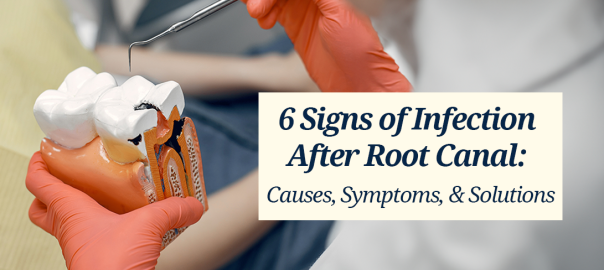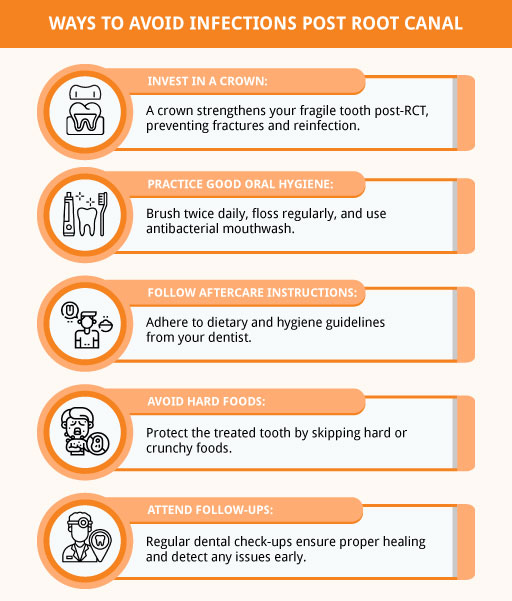
6 Signs of Infection After Root Canal
Recognizing symptoms of a jaw infection after root canal treatment is essential for timely care and maintaining oral health.
Here’s what you need to know.
- Understanding Root Canal Infection Symptoms
- Causes of Infection After a Root Canal
- When to Seek Professional Help
- What to Expect from a Dentist
- Solutions for Post-Root Canal Infections
- Ways to Avoid Root Canal Infections
- Why Choose Clove Dental for your Root Canal Treatments
- Frequently Asked Questions (FAQs)
Understanding Root Canal Infection Symptoms
1. Persistent Pain
Pain after root canal is a common symptom felt after treatment completion. It generally subsides within a few days. If you experience persistent or worsening pain while biting, it could be an indicator of underlying infection. The pain can range from mild discomfort to severe, sharp, throbbing sensations. It can also disrupt daily activities.
2. Swelling
Swelling visible either inside the mouth or over the face can indicate infection. When you notice the swelling not going down or becoming painful, consult your dentist immediately. If ignored, in a few cases, the swelling might even spread to the face or neck, making it difficult to open your mouth or speak clearly.
3. Sensitivity to Hot or Cold
Feeling a little sensitive post-procedure is normal, but not for long. If the sensitivity continues or worsens with either hot or cold temperatures, it may indicate incomplete infection removal. This also indicates a compromised tooth’s protective layer, leaving it prone to bacterial invasions.
4. Foul Smell or Taste
A lingering bad taste or foul breath after root canal completion could indicate that the bacteria have re-entered. This bacteria may now have entered the tooth or even the surrounding tissues. When bad breath or taste, pus formation, or an abscess present themselves, it signals a severe infection that should be immediately taken care of.
5. Discharge or Pus
The presence of:
- Pus
- Abscesses
- Foul-smelling discharge
In and around the treated tooth is a clear sign of infection.
DID YOU KNOW?: Pus is your body’s immune response to fight off the bacteria. It signals and screams infection, demanding your attention, and it should never be ignored.
6. Fever and Fatigue
If the infection spreads beyond the tooth, systemic symptoms like fever, fatigue, or feeling unwell can occur. Seek prompt medical care to prevent further complications. A persistent fever indicates the infection has moved into your bloodstream or adjacent tissues, posing a greater health risk.
Causes of Infection After a Root Canal
- Incomplete Cleaning: The infection might not disappear if the germs or contaminated pulp are not eliminated. This may occur if the root canals are hard to reach or have an odd shape.
- Cracked Tooth or Crown: Bacteria can re-enter through a fracture in the tooth or crown. A tiny fracture can also act as a bacteria’s entry passage, reducing treatment efficiency.
- Poor Oral Hygiene: Reinfection might result from poor dental hygiene. Try to maintain good oral hygiene by brushing, flossing, and using an antimicrobial mouthwash. This helps avoid bacterial accumulation.
- Weakened Immune System: Systemic conditions such as Diabetes, Autoimmune diseases, or extended stress impair the body’s ability to fight infections. A weak immune system increases the risk of developing post-treatment infections.
When to Seek Professional Help
It’s normal to experience mild discomfort after a root canal, but certain symptoms demand immediate attention:
- Unresolved Pain
- Visible Swelling
- Systemic Symptoms
Acting quickly can prevent complications and ensure a full recovery.
What to Expect from a Dentist
When you visit your dentist for post-root canal concerns, they will:
- Examine the treated area: Using X-rays to identify any remaining infection or structural issues.
- Prescribe treatment: This may include antibiotics, pain relief, or even re-treatment of the root canal.
- Discuss surgical options: In rare cases, a minor surgical procedure like an apicoectomy may be necessary to fully resolve the issue.
What Happens if the Infection Spreads?
A re-infected tooth may lead to
- Serious pain after root canal
- Swelling or
- Even a few systemic health issues. In a few extreme cases to conditions like Ludwig’s Angina or cellulitis.
This is why immediate medical attention is recommended for any visible signs of infection.
Solutions for Post-Root Canal Infections
Based on the reason and severity of the infection after treatment, your dentist may recommend one or a mix of the following root canal infection treatments:
- Antibiotics: For systemic infections, doctors might prescribe antibiotics. This aids in managing bacterial proliferation and averting issues.
- Re-Therapy: In several instances, the dentist might have to repeat the root canal to eliminate the lingering infection.
- Apicoectomy: A surgical procedure that extracts the tip of the tooth root and closes the site aids in preventing additional infection.
- Tooth removal: After all options for preserving the tooth have been tried, your dentist may suggest tooth extraction to avoid the further spread of infection.
Ways to Avoid Root Canal Infections
- Always invest in a Cap after RCT: Post Rct completion, your tooth becomes fragile and is likely to fracture. Discuss with your dentist the best-suited crown for your needs to offer extra support and avoid reinfection.
- Maintain good oral health: Brush your teeth two times a day, floss consistently, and use an antibacterial mouthwash to control bacteria.
- Adhere to aftercare guidelines: Follow your dentist’s aftercare instructions, including dietary limitations and hygiene advice.
- Steer clear of tough foods: To prevent damage to the treated tooth, avoid hard or crunchy foods, particularly in the weeks after the procedure.
- Participate in follow-up appointments: Routine examinations help confirm appropriate recovery and tackle any possible problems promptly. Your dentist might use X-rays to ensure the infection has completely cleared up.

Why Choose Clove Dental for your Root Canal Treatments
At Clove Dental, we adopt a practical approach to root canals.
Although some individuals may be concerned about this procedure, our experienced team understands how to care for you. With numerous nationwide clinics, we’re likely around the corner when you require assistance.
What Sets Us Aapart?
At Clove Dental, we prioritize precision, safety, and patient comfort. Our advanced approach to root canal treatments ensures effective outcomes.
What Sets Us Apart?
- State-of-the-Art Technology: Our clinics are equipped with endomotors, apex locators, and in-house CBCT scanners for precise diagnosis and treatment. 3D scans are recommended when needed for complex cases.
- Expert Care: Our skilled and trained dentists perform the procedure with utmost precision, ensuring effective disinfection and treatment success.
- Laser Disinfection: Available at select clinics, laser disinfection of canals offers enhanced cleaning and minimizes reinfection risks.
- Top-Notch Sterilization: We maintain stringent sterilization protocols for instruments and operative disinfection, eliminating bacterial ingress from external sources.
- Patient-Centric Approach: With numerous clinics nationwide, we’re always accessible, providing seamless care tailored to your needs.
Expert Insights
According to the American Association of Endodontists:
“Post-procedure infections are rare but can occur if bacteria re-enter the treated area. This underscores the importance of proper dental care and follow-up visits to monitor healing”.
Dr. Vimal Arora, Chief Clinical Officer at Clove Dental, emphasizes,
“Timely intervention and advanced treatment methods are key to preventing complications after a root canal procedure. Regular dental visits play a crucial role in maintaining oral health.”
Frequently Asked Questions (FAQs)
1. How do I know if my jawbone is infected after a root canal?
Jawbone infection symptoms include:
- Continued pain after root canal beyond several days.
- Swelling in the gums, jaw, or even your face.
- Fever, chills, or a general feeling of tiredness.
- Chewing or opening your mouth is painful.
2. Why is my tooth still sensitive after a root canal?
Mild sensitivity may be experienced for a few days after a root canal. This generally resolves spontaneously.
If the pain continues or gets worse, it may be indicative of:
- The infection wasn’t fully cleaned.
- The filling or crown is not seated properly..
Schedule an appointment with your dentist if pain continues to be disruptive to your daily routine.
3. How do I deal with pain during and after my RCT?
Discomfort or root canal pain, can be managed effectively with a few simple do’s and don’ts.
Do’s:
- Take over-the-counter pain relievers as suggested by your treating doctor.
- Apply ice packs to reduce swelling and numb the area.
- Maintain good oral hygiene, brushing gently around the treated area.
Don’ts: Avoid hard, crunchy, or sticky foods that put pressure on the treated tooth.
4. Can a root canal fail after years?
Yes, a root canal can fail even years later due to:
- New cavities or decay that expose the treated area.
- Cracks or fractures in the tooth or crown.
- Poor oral hygiene allows bacteria to re-enter.
Routine dental check-ups and proper oral care are essential to detect and prevent such issues early.
5. What happens if the infection spreads to the jaw?
An untreated infection spreading to the jaw can cause:
- Severe swelling, pain, and abscess formation.
- Difficulty swallowing or speaking.
- Systemic complications like fever or sepsis.
An immediate dental or medical intervention is needed to curb the further risks.
Leave a Reply
Leave a Reply
Explore More Similar Posts
Explore More Blogs


Leave a Reply